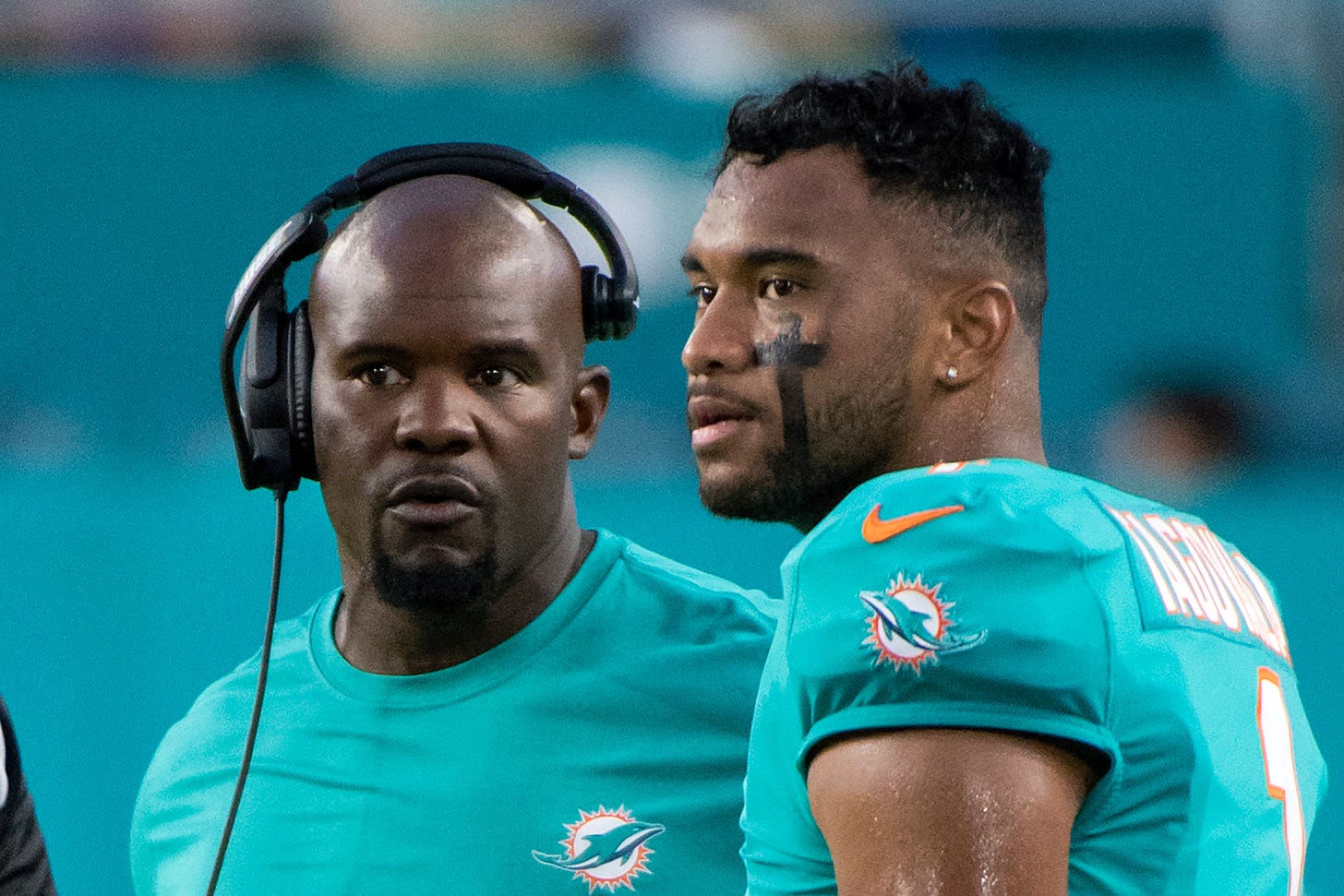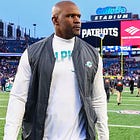Thoughts on Tua, Brian Flores, and Abusive Bosses
It was already well-known that Tua Tagovailoa and his former head coach, Brian Flores, did not get along. But he went into more detail in a very candid and revealing interview this week with Dan LeBatard. The whole interview is worth listening to, but the part that really made the rounds came at the end:
Dan: Can you explain to us the difference, in practical terms, between having a coach who did believe in you the way that he [Mike McDaniel] did, and the difference between that and what was happening with Flores?
Tua: Yeah, well… to put in simplest terms: If you woke up every morning, and I told you you sucked at what you did, that you don’t belong doing what you do, that you shouldn’t be here, that this guy should be here, that you haven’t earned this right…
And then you have somebody else come in and tell you: “Dude, you are the best fit for this. Like, you are accurate. You are the best whatever, you are this, you are that.” Like, how would it make you feel, listening to one or the other? You see what I’m saying? And then you hear it, you hear it — regardless of what it is. The good or the bad. You hear it more and more, you start to actually believe that. I don’t care who you are. You could be the President of the United States. You have a terrible person that’s telling you things that you don’t want to hear or that you probably shouldn’t be hearing, you’re going to start to believe that about yourself. And that’s sort of like what ended up happening…
There’s a lot to unpack here, given all we know about the people involved, and so I think it’s helpful to take it one step at a time.
1) It’s obviously tempting to perceive Tua’s comments through the lens of Old School vs New School coaching styles. Brian Flores, who coached Tagovailoa during his first two seasons in the NFL, has a reputation for being kind of a hard-ass as a coach, while Mike McDaniel has a much more player-friendly vibe.
But this dichotomy really does us no favors, and I think it obscures more than it helps us understand the relationship between coach and player. Tua played for Nick Saban in college, so I doubt that he’s opposed to being coached hard. Like most players, he is capable of having a good relationship with a tough coach. But there is a difference between tough coaching and abusive coaching, and it seems like Flores probably crossed that line. While Tua didn’t go into specifics, some people who covered the Dolphins in the years Flores were there, like Jeff Darlington, have reported on behavior that seems to go beyond “tough coaching,” like sending insulting texts to Tua the night before games.
And yet whenever there are complaints about an abusive boss, there are people who default to the excuse that it’s merely a stylistic thing, and that some bosses need to be demanding to get the best out of people. It’s worth emphasizing that being abusive and being demanding are different things. Some amount of subjectivity is probably unavoidable here, but one way of mitigating this ambiguity is by clear and consistent rules about how a boss is allowed to behave, but that rarely happens in capitalism.
This is no accident. Capitalists like to give managers broad authority and vague standards for behavior because this ambiguity benefits them. Owners can constantly tell management to demand more from employees. If the employees respond well, then they can pat themselves on the back for having high standards. If the employees respond poorly, they can, as the Dolphins did, fire the manager for failing to realize he crossed the line that had never been explicitly laid out. In other words, abusive bosses are a natural consequence of the authority capitalism grants to owners.
2) The framing of Dan LeBatard’s question, and the premise behind Tua’s answer, is that Tua’s career was floundering under Flores, and he has revitalized it under McDaniel’s encouragement. And that’s certainly true… but let’s not go crazy here.
Miami’s record in two years of McDaniel (20-14) isn’t actually all that different from its record under the last two years of Brian Flores (19-14). Tagovailoa’s numbers are way better now, but that is likely the result of McDaniel's high-speed offense — and the addition of Tyreek Hill obviously hasn’t hurt. Nevertheless, the team has faded down the stretch in each of the last two seasons, and Tua’s performance in big games has been lackluster. Although he made the Pro Bowl last year and just signed a big contract, there are still major questions about whether he is really worth the hype.
I don’t point this out to knock Tua or McDaniel, both of whom I like. But it is tempting to insist being a supportive coach is how you get the most out of your players. Both Tagovailoa and LeBatard seem to suggest as much in the interview. That is certainly true sometimes, but there are plenty of assholes who get results from their players too. It would be nice if being an abusive boss meant your employees wouldn’t work as hard or as well — then we wouldn’t have to make rules against abusive behavior. But we know from experience that this isn’t true.
If treating your employees like shit never worked, then every boss would be Mr. Rogers. But we know they aren’t, because sometimes abuse is “effective.” The reason to oppose abusive behavior from coaches and managers is that it is wrong. Treating people with respect is a basic moral precept, not some workplace productivity hack. It is certainly nice to hear a story like Tua’s, where the improved confidence led to better performance. And it’s important to stress that abuse is not NECESSARY to coach effectively. But we should be careful about taking it too far, and pretending a worker’s interests are always aligned with his boss.
3) Finally, I want to talk about Brian Flores, who I obviously have some affection for thanks to his brave choice to sue the NFL for discriminatory hiring.
It’s worth remembering that one of the allegations Flores made in that lawsuit is that Dolphins owner Stephen Ross asked him to lose games in his first season, to improve Miami’s draft position, and allegedly even offered to pay him $100,000 per loss. Ross denied that, but an internal league investigation found that Ross DID make comments about wanting to lose to get a better spot in the 2020 draft — the draft in which they selected Tua Tagovailoa.
In other words, Flores and Tua were forced together by a system that limited both their autonomies. Flores had no choice but to groom a quarterback he obviously wasn’t crazy about because his boss had been enamored with him for some time.1 And Tua had no choice but to play for the team that drafted him, even if the coach hated him. It’s no wonder that relationship didn’t work out…
I don’t say this to make excuses for Flores. Obviously he still should have treated his star rookie better. And Flores, to his credit, acknowledged making mistakes with Tua when he was asked about these comments. But Flores has had a lot of success in the NFL, and seems to be capable of having good relationships with players. It’s not that he or his style is inherently abusive, but when two people are forced to work together in a way that isn’t set up well for either of them, that’s likely to lead to crappy behavior.
This is what socialists mean when they talk about employees having power over the conditions and manner of employment. A player should have some say in who his coach is and what team he plays for; a coach shouldn’t be stuck with players he has no interest in coaching. Rules about proper treatment of your coworkers should be clear, transparent, and subject to input from those impacted. If not, then workplaces become toxic as bosses have to use brute force to motivate people they have no organic way of connecting with, and employees have to put up with whatever shitty behavior gets thrown at them or risk getting fired or retaliated against.
Tua was not the first pick — or the first quarterback — taken in the 2020 draft, but at the time Flores was first hired, in 2019, Tagovailoa was coming off his sensational 2018, and most people expected him to be the #1 pick when he came out of college.




